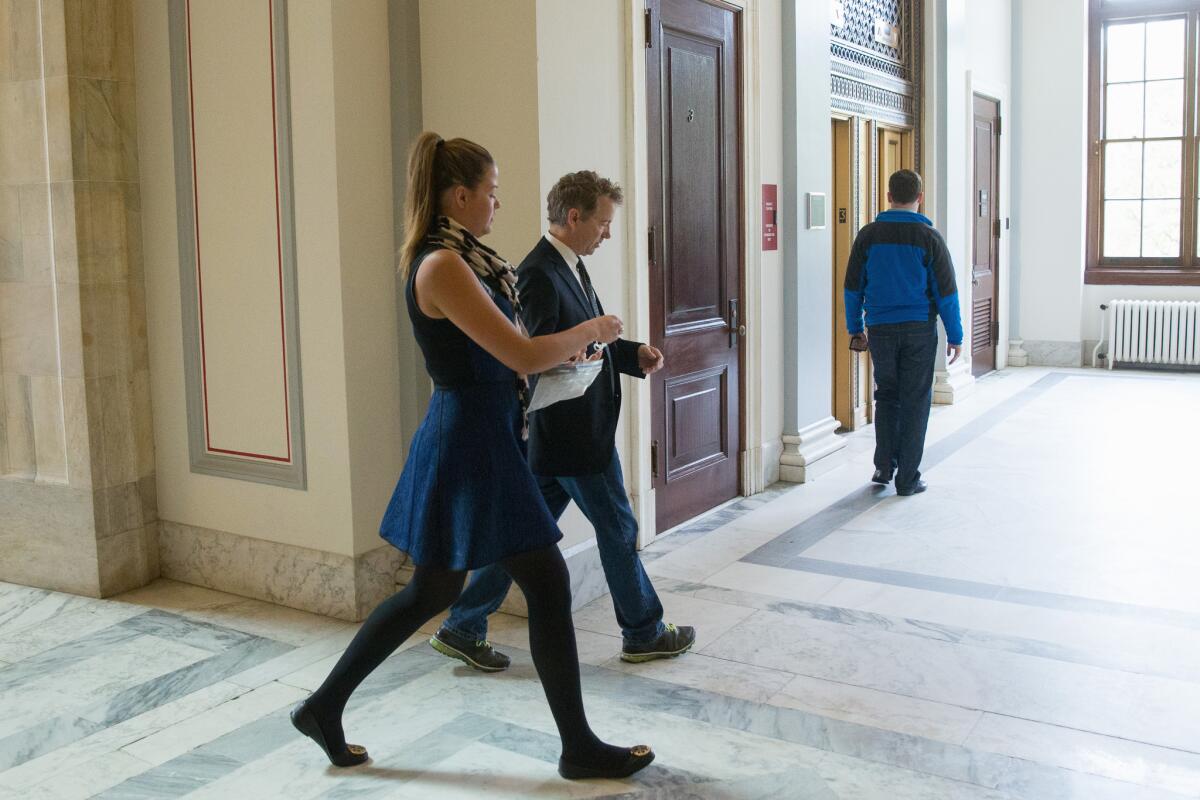Budget deal close to final passage -- but not before mini-filibuster

Republican presidential candidate Sen. Rand Paul of Kentucky walks around Capitol Hill in Washington. He led a mini-filibuster to delay passage of a federal budget deal.
- Share via
Reporting from Washington — The Senate prepared for an all-nighter Thursday to give final passage to an $80-billion budget deal -- but not without a mini-filibuster from Sen. Rand Paul (R-Ky.).
Seizing the Senate floor has proved a lucrative fundraising tool for Paul and other presidential hopefuls. Sen. Ted Cruz (R-Texas), another presidential candidate, canceled his Thursday events in Las Vegas to return for the Senate session.
“We will find out who the true conservatives in this town are,” Paul said as he planted himself in the chamber and vowed to talk until the scheduled 1 a.m. vote Friday.
He took a break from the floor soon after he started speaking, however.
Despite facing criticism for missing many Senate votes, Sen. Marco Rubio (R-Fla.), who has gained on his rivals in the GOP primary race, was not expected to leave the campaign trail Thursday.
The two-year budget package was expected to pass the Senate, and go to the White House for President Obama’s signature, despite the last-minute protest.
“It shouldn’t be too long after midnight,” Sen. John Thune (R-N.D.) said after a lunch with GOP senators.
Paul, whose presidential bid has lagged in the crowded Republican field, dashed off a tweet appealing to donors as he fought a budget deal that also raises the nation’s $18.1-trillion debt limit.
“#StandwithRand during his debt ceiling filibuster. Donate $20.16 to send a message to the Washington machine,” he tweeted.
Rand and Cruz headed back to Washington fresh from the GOP debate in Colorado. On a stage crowded with 10 candidates, Cruz was among a handful who appeared to benefit from the raucous debate.
The protest in the Senate was more about political message-making than actually preventing the bill from final approval.
The House already has approved the budget accord, and it appears to have enough support in the Senate to break a filibuster and pass -- meaning opponents were simply running out the clock until the pre-dawn vote.
The budget deal was negotiated between congressional leaders led by outgoing Speaker John A. Boehner (R-Ohio) and the White House. It aims to bring stability to the constant shutdown battles over fiscal matters.
The accord reverses $80 billion in mandatory spending cuts, prevents Medicare premium hikes on seniors and shores up the Social Security Disability Insurance fund. It also raises the debt limit until March 2017, after next year’s presidential election.
Democrats led a bipartisan majority in the House to pass the measure this week as most Republicans objected to the deal.
Sen. Bernie Sanders of Vermont, who is running for the Democratic presidential nomination, backs the budget deal.
Passage avoids an immediate crisis since the Treasury Department has said Congress must raise the debt limit by Tuesday to provide enough fiscal cushion to avoid a credit default.
But Congress faces another pressure point next month. Temporary government funding runs out on Dec. 11 and lawmakers must pass legislation to keep offices operating at the new spending levels or risk a shutdown.
For the latest from Congress and 2016 campaign follow @LisaMascaro
For more, go to www.latimes.com/politics
More to Read
Sign up for Essential California
The most important California stories and recommendations in your inbox every morning.
You may occasionally receive promotional content from the Los Angeles Times.














